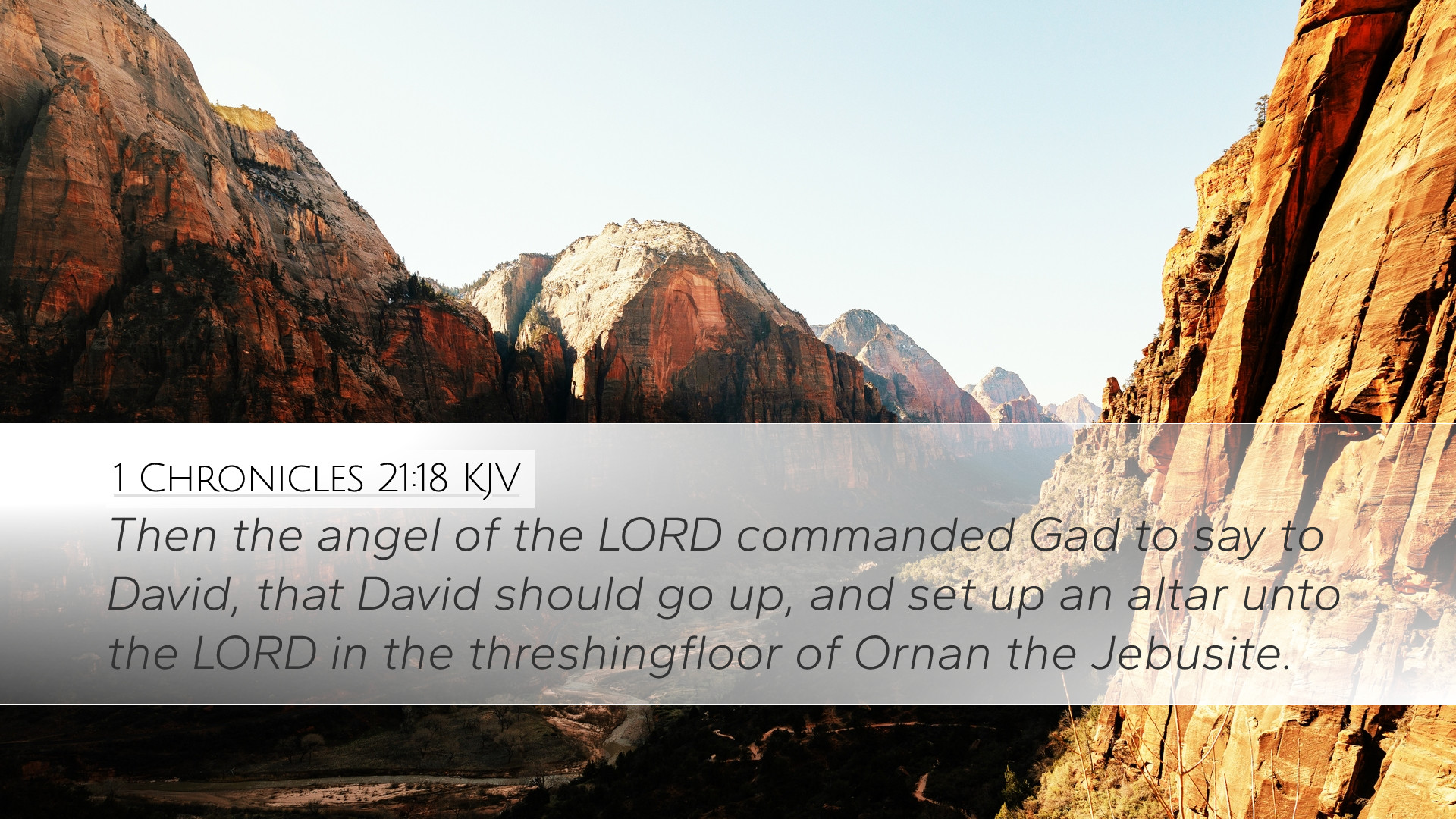Commentary on 1 Chronicles 21:18
This verse captures a pivotal moment in the narrative of David's reign, especially concerning his relationship with God and the consequences of sin. The context involves David's census of Israel, which was an act of pride and disobedience; this ultimately led to severe consequences for the nation he governed.
Verse Analysis
Text of 1 Chronicles 21:18 (KJV): "Then the angel of the LORD commanded Gad to say to David, that David should go up, and set up an altar unto the LORD in the threshing floor of Ornan the Jebusite."
Contextual Background
The backdrop of this chapter is the discontent that arose from David’s decision to conduct a census. As noted by Matthew Henry, this act was rooted in pride, revealing a reliance on numbers rather than on God's sufficiency.
David's Sin
David's decision to number the people was seen as an affront to God’s sovereignty. Both Albert Barnes and Adam Clarke highlight that David's sin was not merely administrative but a thrust against divine authority, indicating a lack of faith in God's providence. This crucial misstep drew God's displeasure and triggered a series of tragic events.
Divine Judgment
The consequences included a pestilence that devastated Israel, compelling David to seek God's mercy. It is within this context that verse 18 unfolds, indicating Divine intervention through Gad the prophet.
The Role of the Angel of the LORD
The “angel of the LORD” signifies a direct involvement from God in human affairs. Matthew Henry explains that this angel is often understood as a manifestation of God's presence, delivering vital messages or offerings of judgment and mercy.
God's Mercy and Guidance
In the midst of judgment, God’s communication through Gad demonstrates His mercy. David is instructed to build an altar, a site for atonement and reconciliation. This reflects the theme prevalent throughout Scripture that even in the face of rebellion, God's desire is to restore and redeem.
Setting Up the Altar
The instruction to erect an altar on the threshing floor of Ornan illustrates significant theological themes. The threshing floor was a place of separation, marking the removal of chaff from grain, symbolizing purification and divine judgment.
The Threshing Floor of Ornan the Jebusite
The choice of the threshing floor, a location owned by a Jebusite, resonates with the broader narrative of Israel’s history. Adam Clarke points out the notion of acquiring property from a foreigner signifies that God's plans transcend ethnic boundaries, underscoring the inclusion of Gentiles in God’s redemptive plan.
Theological Implications
This verse opens a window into key theological concepts:
- Repentance: David's willingness to build the altar reflects a penitent heart, eliciting God's forgiveness. Barnes emphasizes that genuine repentance must involve action and commitment to God.
- Sacrifice: The altar represents the sacrificial system that points to the ultimate sacrifice—Christ. This foreshadows the escalation of God's salvific plan.
- Divine Consequence and Restoration: God's corrective measures are not merely punitive; they are redemptive. The act of building an altar becomes a pivotal point for restoration between God and Israel.
Application for Today's Believers
For pastors, students, and scholars, verse 18 serves as a reminder of the importance of humility and obedience to God’s will. It challenges believers to examine their hearts in the pursuit of power, success, or influence. The following applications arise:
- Self-Examination: Like David, we must seek God’s guidance before undertaking significant actions, ensuring they align with His will.
- Building Altars: Establishing personal altars in our lives—symbols of dedication and reconciliation with God—reminds us of the ongoing need for repentance and sacrifice.
- Community Restoration: Seeking restoration within communities mirrors David’s approach; understanding that true leadership requires humility before God and serving others.
Conclusion
1 Chronicles 21:18 stands as a profound testament to God's grace amidst human failure. The narrative illustrates a sovereign God who calls individuals to repentance and worship, emphasizing that the path to restoration often travels through the acknowledgment of our shortcomings and the offering of sincere sacrifice.
As believers reflect on this scripture, it serves as an invitation to engage deeply with God's plans, structure our lives around worship, and seek ongoing reconciliation with Him and one another.


